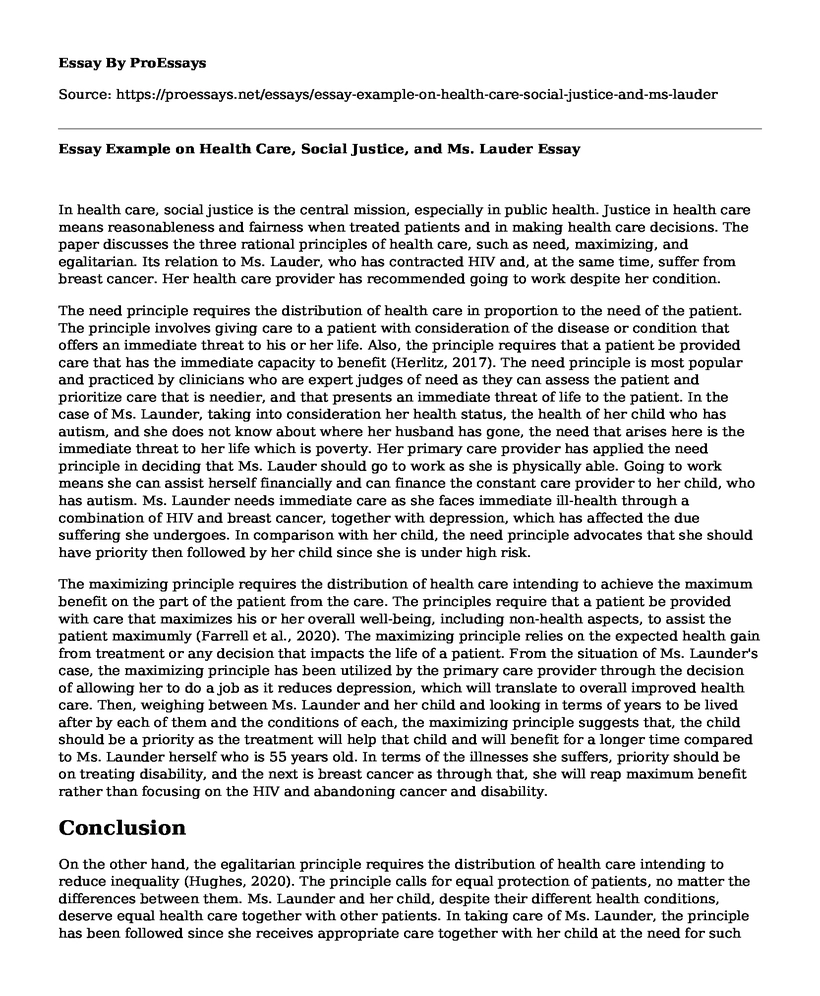In health care, social justice is the central mission, especially in public health. Justice in health care means reasonableness and fairness when treated patients and in making health care decisions. The paper discusses the three rational principles of health care, such as need, maximizing, and egalitarian. Its relation to Ms. Lauder, who has contracted HIV and, at the same time, suffer from breast cancer. Her health care provider has recommended going to work despite her condition.
The need principle requires the distribution of health care in proportion to the need of the patient. The principle involves giving care to a patient with consideration of the disease or condition that offers an immediate threat to his or her life. Also, the principle requires that a patient be provided care that has the immediate capacity to benefit (Herlitz, 2017). The need principle is most popular and practiced by clinicians who are expert judges of need as they can assess the patient and prioritize care that is needier, and that presents an immediate threat of life to the patient. In the case of Ms. Launder, taking into consideration her health status, the health of her child who has autism, and she does not know about where her husband has gone, the need that arises here is the immediate threat to her life which is poverty. Her primary care provider has applied the need principle in deciding that Ms. Lauder should go to work as she is physically able. Going to work means she can assist herself financially and can finance the constant care provider to her child, who has autism. Ms. Launder needs immediate care as she faces immediate ill-health through a combination of HIV and breast cancer, together with depression, which has affected the due suffering she undergoes. In comparison with her child, the need principle advocates that she should have priority then followed by her child since she is under high risk.
The maximizing principle requires the distribution of health care intending to achieve the maximum benefit on the part of the patient from the care. The principles require that a patient be provided with care that maximizes his or her overall well-being, including non-health aspects, to assist the patient maximumly (Farrell et al., 2020). The maximizing principle relies on the expected health gain from treatment or any decision that impacts the life of a patient. From the situation of Ms. Launder's case, the maximizing principle has been utilized by the primary care provider through the decision of allowing her to do a job as it reduces depression, which will translate to overall improved health care. Then, weighing between Ms. Launder and her child and looking in terms of years to be lived after by each of them and the conditions of each, the maximizing principle suggests that, the child should be a priority as the treatment will help that child and will benefit for a longer time compared to Ms. Launder herself who is 55 years old. In terms of the illnesses she suffers, priority should be on treating disability, and the next is breast cancer as through that, she will reap maximum benefit rather than focusing on the HIV and abandoning cancer and disability.
Conclusion
On the other hand, the egalitarian principle requires the distribution of health care intending to reduce inequality (Hughes, 2020). The principle calls for equal protection of patients, no matter the differences between them. Ms. Launder and her child, despite their different health conditions, deserve equal health care together with other patients. In taking care of Ms. Launder, the principle has been followed since she receives appropriate care together with her child at the need for such care.
References
Farrell, T. W., Francis, L., Brown, T., Ferrante, L. E., Widera, E., Rhodes, R., ... & Liu, S. W. (2020). Rationing Limited Health Care Resources in the COVID19 Era and Beyond: Ethical Considerations Regarding Older Adults. Journal of the American Geriatrics Society. https://onlinelibrary.wiley.com/doi/abs/10.1111/jgs.16539
Herlitz, A. (2017). Indeterminacy and the principle of need. Theoretical medicine and bioethics, 38(1), 1-14. https://link.springer.com/article/10.1007/s11017-016-9393-5
Hughes, R. C. (2020). Egalitarian Provision of Necessary Medical Treatment. The Journal of Ethics, 24(1), 55-78. https://link.springer.com/article/10.1007/s10892-019-09309-y
Cite this page
Essay Example on Health Care, Social Justice, and Ms. Lauder. (2023, Aug 30). Retrieved from https://proessays.net/essays/essay-example-on-health-care-social-justice-and-ms-lauder
If you are the original author of this essay and no longer wish to have it published on the ProEssays website, please click below to request its removal:
- Safety, Nutrition and Health in Early Education - Course Work Example
- Nursing Leadership and Management on Nursing Shortages and Turnover Essay
- Paper Example on Leiomyoma in Pregnancy: Impact of IVF
- Essay Sample on Probiotics: Benefits for Health & Digestive System
- Essay Sample on Transitional Justice: Prosecution, Truth Commissions, Reparations & Constitutional Reforms
- Lewis V Heartland Inns: Employee Wins Dismissal Case in 8th Circuit - Essay Sample
- Centering in X-Ray Imaging - Free Report Sample







